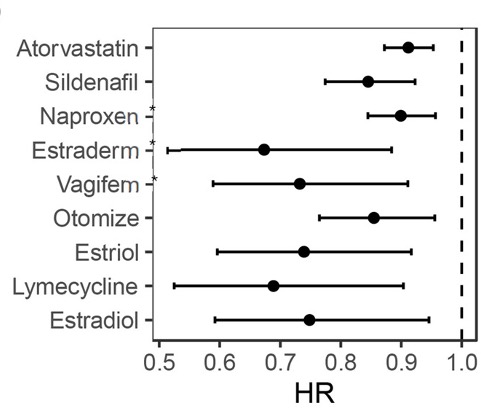Key Points:
- Government-approved drugs like the statin Atorvastatin and the anti-inflammatory Naproxen lower the risk of mortality.
- Some drugs are sex-specific, such as Vagifem for women and Sildenafil for men.
- The optimal doses for select drugs are also discussed.
In the arenas of longevity (living longer) and healthspan (living healthier longer) repurposing government-approved drugs strikes the fancy. The problem is that approved drugs are usually prescribed to individuals with unhealthy conditions. For this reason, Swiss researchers say they sought to determine which approved drugs could lower the risk of early mortality in the general population.
To determine which prescription drugs could lower mortality risk, the researchers analyzed individuals from the UK Biobank, a large-scale biomedical database of participants from the United Kingdom. From this UK population, the researchers examined over 500,000 adults aged 37 to 73 for 14 years, of whom 8.4% died.
The researchers found that over 400 distinct drugs were prescribed to more than 500 participants for at least 3 months. Critical for the analysis, each drugged participant was well matched with a non-drugged participant. The results showed that 169 of the drugs, including morphine, were associated with a shorter lifespan. However, 14 of the drugs were associated with a longer lifespan.
The drugs associated with prolonging life included the statin (cholesterol lowering drug) Atorvastatin, the erectile dysfunction medication Sildenafil, the anti-inflammatory Naproxen, and the estrogen related drugs Estraderm, Vagifem, Estriol, and Estradiol. Other drugs included the vaccines Avaxim and Revaxis.

Drug Sex Differences
Considering that estrogen related drugs are only approved for women and erectile dysfunction drugs only approved for men, the researchers sought to determine which drugs work well with both sexes. As a result, they found that Atorvastatin, the statin, increased lifespan in both males and females. On the other hand, Naproxen’s effect was more pronounced in men and Otomize, an anti-inflammatory and anti-bacterial medication for ear infections, more pronounced in women.
Drug Doses
Of select drugs associated with a lower risk of early death, the researchers sought to hone in on the doses most conducive to extending lifespan. For Atorvastatin, a 10 mg and 40 mg dose had no effect, whereas an 80 mg dose increased mortality rates and a 40 mg dose lowered mortality rates. Thus, 40 mg appears to be the optimal dose for potential lifespan extension with Atrovastin. For Naproxen, both 250 mg and 500 mg similarly lowered mortality rates. Tadalifil, an erectile dysfunction medication, reduced mortality at all doses but was most pronounced at 10 mg. Sildenafil also reduced mortality at all doses and had a more pronounced effect at 50 mg.
Limitations
The study has two major limitations. In an attempt to determine how approved drugs could affect the general population, the researchers accounted for various confounding variables that may shorten lifespan, including smoking status, diabetes, male sex, and cancer diagnoses. However, the participants on drugs were on drugs for a specific reason, namely to treat an unhealthy or adverse condition. This limitation makes it difficult to apply the findings of this study to healthy individuals.
The other major limitation is the study’s design, being a correlative study. While the drugs mentioned are correlated with a longer lifespan, it does not mean these drugs are the cause of a longer lifespan. Various factors, unaccounted for in this study, can influence how long someone lives. For example, diet and exercise status were not accounted for and these factors alone can drastically alter how long someone lives.
With these limitations in mind, it may be difficult to know if taking one of the above drugs may be beneficial to one’s lifespan. It could be that these drugs are only beneficial for individuals with certain conditions, such as those with high LDL cholesterol in the case of Atorvastatin or with chronic inflammation in the case of Naproxen. A study testing the effect of these drugs on the lifespan of healthy individuals will make this more clear.